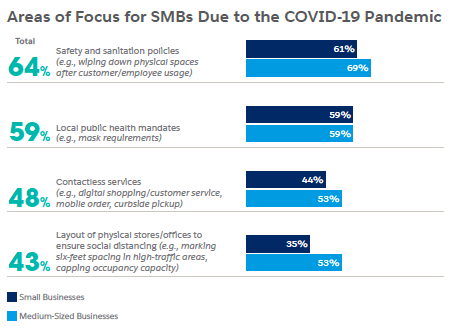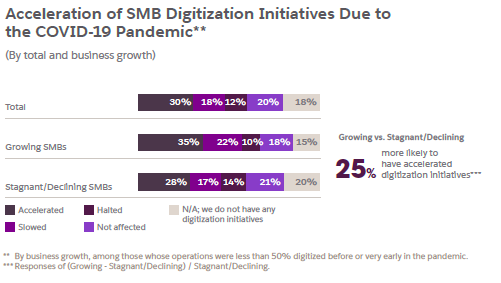Small and Medium Businesses (SMEs) in the UK have been almost universally affected by the COVID-19 crisis, and new challenges have emerged as it continues to affect the world. For many SMEs, ensuring customer safety and complying with regulations has become a top priority – even if it wasn’t on their agenda just ten months ago. But having to pivot to address emerging concerns – and dedicate scarce resources towards building stability – can present their own obstacles.
How are UK SMEs evolving to meet these new challenges? What can the latest SME trends tell us about the current moment, and about what we might expect in the future? Let’s take a look at the 4th edition of Salesforce’s SME Trends Report to find out.
UK SMEs are focusing on customer safety
According to the SME Trends Report from Salesforce, SME leaders are emphasising on safety and sanitation policies. A total of 64% of leaders globally say that they’re focussing on these issues due to the COVID-19 pandemic, while 59% say that they’re prioritising local public health mandates.
Lockdown measures meant that many SMEs had to transform their service and engage in new ways, which is evident in the 48% of leaders globally who state that they’re prioritising contactless services. Digital shopping, mobile ordering, on-demand delivery, and kerbside pickup have all seen a considerable uptake, and many of these models aren’t just temporary – they’re here to say.
In fact, these safety-first services proved to be so convenient that many customers won’t go back to their old ways of shopping. Salesforce’s Connected Customer survey shows that 77% of customers say that the crisis should be a catalyst for business improvement – treading water is no longer enough.
The bar for customer service has been raised, customer expectations have never been higher, and many SMEs have been forced to re-imagine their customer experience.

When it comes to SME trends, customer experience is key
When trying to craft personalised experiences to keep customers engaged, UK SMEs have come up against several challenges. At relatively short notice, businesses have had to engage with customers on their favourite channels, in ways that meet the customers expectations. Digitalisation can address some of these issues, but in-person encounters haven’t gone away entirely; when they do occur, UK SMEs have found it difficult to ensure that they are implementing the correct safety measures needed to keep their customers safe.
For SME leaders globally, the top three challenges to meeting customer expectations are bringing innovative offerings to market, keeping up with demand, and personalising customer engagement. Small businesses and medium-sized businesses are also facing different pain points, with the latter 65% more likely to struggle with providing connected experiences. For many medium-sized businesses, providing their larger, more established customer bases with seamless experiences has been difficult, but it’s an issue that needs to be addressed quickly, as the possibility of losing customers to more digitally mature competitors is real.
Many UK SMEs have turned to new technologies to meet rising customer expectations, empower their employees and ensure a safer workplace. They’re also finding new ways to communicate, and leveraging the power of communication to build better, more meaningful relationships.
No more small talk: SME interactions are changing
In striving to meet customer expectations, UK SMEs have had to rethink how they communicate, and the ways in which customers can reach them. Transparency, authenticity, and honesty are at the heart of these new ways of communication. With 66% of customers in Salesforce's Connected Customers survey now expecting businesses to understand their needs on a unique and personal level, it’s no surprise that growing SMEs globally are more likely than stagnant/declining SMEs to have changed their customer interactions during the pandemic.
A look at the SME Trends Report shows that growing SMEs have offered more flexibility for their customers and prioritised building relationships over one-time transactions.
Stagnant or declining businesses, meanwhile, haven’t focussed on personal engagement and tend to be more mercenary in nature, with only 32% prioritising relationship-building vs. one-off transactions. From the numbers above, it’s clear which road will lead EU SMEs towards growth.
For UK SMEs, digital is king
The SME Trends Report has provided a good blueprint for success. Today’s SMEs need to create a safe work environment, provide connected experiences, and focus on building more meaningful relationships through personalised communications.

Our survey shows that a good portion of UK SMEs have already started along the path to digital transformation, with 21% having implemented a CRM over the past year, but many still have some way to go before they become truly digital-first. The current climate is challenging, but it’s also transformative. UK SMEs that take their customers advice and use the crisis as an opportunity to improve their business will be stronger, faster, more customer-centric, and better prepared to face the future.
To read more about how SMEs are evolving in the current climate, download the 4th edition of Salesforce’s SME Trends Report. And to see a demo about how Salesforce solutions can help UK SMEs unite their processes and connect with their customers, check out our quick video.








